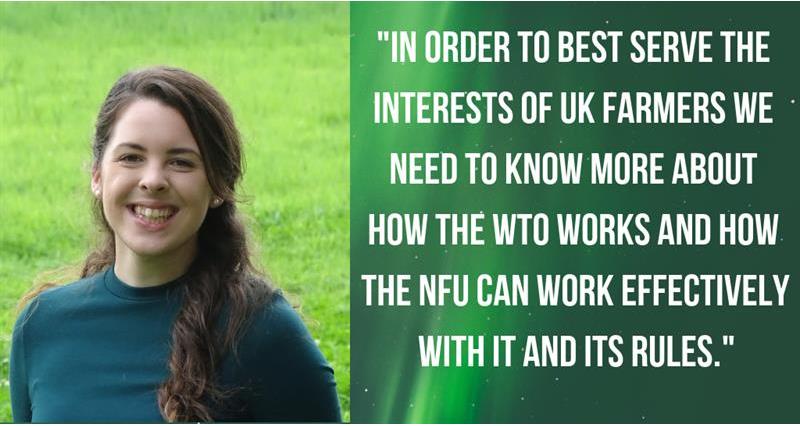The NFU recently sent a delegation to investigate what being an independent member of the WTO would mean for farming in the UK. Here, Rebecca Hesketh, our EU exit and international trade adviser, reports back:
A trip to the World Trade Organisation (WTO) in Geneva is always an eye-opener, where you can see for yourself not only the complexity of the organisation and issues that it deliberates upon on a day-to-day basis, but also the enormity of the impact that international trade can have on the livelihood of farmers back in the UK.
Whatever your views on the European Union, it’s hard to argue against the fact that being a member of the biggest agricultural trader in the world has helped to put a buffer between us and the ups and downs of global trading.
However, with this ‘buffer’ set to be removed, we need to know more about how the WTO works and how the NFU can work effectively with it and its rules, in order to best serve the interests of UK farmers. Our recent trip to Geneva was to do just that. So we lined up many trade experts to discuss the issues over an intense couple of days.
Agriculture has always been a ‘sensitive’ subject in the context of international trade talks. This merely reflects how very important farmers are in the eyes of governments around the world – whether it’s the EU looking to maintain its model of high cost, high quality production or the approach of the big agricultural exporters such as the US and South America who are always looking for more places to ship off agricultural exports to.
Market access for agriculture is nearly always on the agenda and the debate can get heated - this was the message we heard loud and clear whilst we were at the WTO and is something that UK farmers have to be ready for.
Establishing the UK’s Schedule of Concessions
As previously reported on NFU Online (see Invoking Article 28: The next step for the UK at the WTO), the UK has already started the process of re-establishing itself as an independent member of the WTO and the government is well on the way to settling what our ‘commitments’ to the other WTO members are.
The government has circulated a draft ‘Schedule’ which sets out the top rate of tariffs we could apply to goods at the border as well as a number of tariff rate quotas (TRQs) that grant concessions from having to pay the full tariffs for a set volume of product coming into the country.
However, as expected, a number of objections have been made by other members of the WTO to the UK’s draft Schedule. These objections will draw us into our first set of formal negotiations over market access.
For example, the New Zealanders are pressing to increase its already generous market access to the UK market for its lamb and dairy products, while the USA and Australia will be looking for increased concessions for beef and other products. A number of other countries are likely to also want to negotiate with the UK government.
During the visit, the NFU met with the UK Ambassador to the WTO, Julian Braithwaite, and it’s certainly reassuring that thus far in the process the UK government has been firm in its stance in not allowing further access for agricultural products.
But there is no doubt that the pressure will increase from already well-established members to make market access concessions - a taster of the pressure that our government is likely to continue to encounter when it leaves the EU.
The NFU will be watching keenly and will continue to work with government to ensure that UK farmers are not disadvantaged through this process of establishing our Schedules.
The WTO is facing its own uncertainty
Unusually, Brexit and the uncertainty it brings was not the biggest headache for those we were talking to. In fact the WTO has more than enough problems of its own. Times are definitely changing for the organisation, which has seen little progress in ‘raising that bar’ to make trade simpler.
The most recent round of talks to improve the basic rules of global trade in agricultural goods (the Doha Development Round) has stalled and little progress has been made in recent years. At the same time, the WTO is facing internal challenges regarding the enforcement of its rules among its members, led in the most part by the USA and its fiercely independent President.
What this means for the relevance of the WTO and the rules, few know. However the vast majority of countries within the WTO believe that there will always be role for a rules-based organisation to monitor global trade and to resolve disputes.
If the WTO is to continue to do this and be relevant for modern trading economies, reform must happen.
More of the NFU's work on Brexit:
